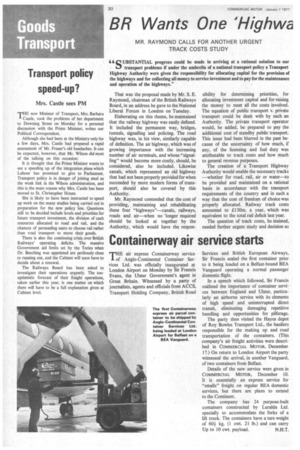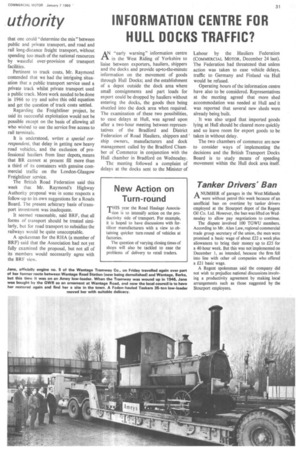BR Wants One Wighwa uthority
Page 32

Page 33

If you've noticed an error in this article please click here to report it so we can fix it.
MR. RAYMOND CALLS FOR ANOTHER URGENT TRACK COSTS STUDY 6 6 USSTANTIAL progress could be made in arriving at a rational solution to our 10 transport problems if under the umbrella of a national transport policy a Transport Highway Authority were given the responsibility for allocating capital for the provision of the highways and for collecting all money to service investment and to pay for the maintenance and operation of the highways."
That was the proposal made by Mr. S. E. Raymond, chairman of the British Railways Board, in an address he gave to the National Liberal Forum in London on Tuesday.
Elaborating on this theme, he maintained that the railway highway was easily defined. It included the permanent way, bridges, tunnels, signalling and policing. The road highway was, in hit view, similarly capable of definition. The air highway, which was of growing importance with the increasing number of air terminals, and whose "signalling" would become more costly, should, he considered, also be included. Likewise canals, which represented an old highway that had not been properly provided for when succeeded by more modern forms of transport, should also be covered by this Authority.
Mr. Raymond contended that the cost of providing, maintaining and rehabilitating these four "highways"—canals, railways, roads and air—when no longer required should be looked at together by the Authority, which would have the respon sibility for determining priorities, for allocating investment capital and for raising the money to meet all the costs involved. The equation of public transport v. private transport could be dealt with by such an Authority. The private transport operator would, he added, be prepared to pay the additional cost of standby public transport. This issue had been blurred in the past because of the uncertainty of how much, if any, of the licensing and fuel duty was attributable to track costs and how much to general revenue purposes.
The creation of a Transport Highway Authority would enable the necessary tracks —whether for road, rail, air or water—to be provided and maintained on a rational basis in accordance with the transport requirements of the country and in such a way that the cost of freedom of choice was properly allocated. Railway track costs amounted to £130m. a year, which was equivalent to the total rail deficit last year.
The question of track costs, he insisted, needed further urgent study and decision so that one could "determine the mix" between public and private transport, and road and rail long-distance freight transport, without spending too much of the national resources by wasteful over-provision of transport facilities.
Pertinent to track costs, Mr. Raymond contended that we had the intriguing situaation that a public transport service used a private track whilst private transport used a public track. More work needed to be done in 1966 to try and solve this odd equation and get the question of track costs settled.
Regarding the Freightliner project, he said its successful exploitation would not be possible except on the basis of allowing all who wished to use the service free access to rail terminals.
It is understood, writes a special correspondent, that delay in getting new heavy road vehicles, and the exclusion of professional hauliers from liner depots, means that BR cannot at present fill more than a third of its containers with genuine commercial traffic on the London-Glasgow Freightliner service.
The British Road Federation said this week that Mr. Raymond's Highway Authority proposal was in some respects a follow-up to its own suggestions for a Roads Board. The present arbitrary basis of transport investment was inadequate.
It seemed reasonable, said BRF, that all forms of transport should be treated similarly, but for road transport to subsidize the railways would be quite unacceptable.
A spokesman for the RHA (a member of BRF) said that the Association had not yet fully examined the proposal, but not all of its members would necessarily agree with the BRF view.




















































































































